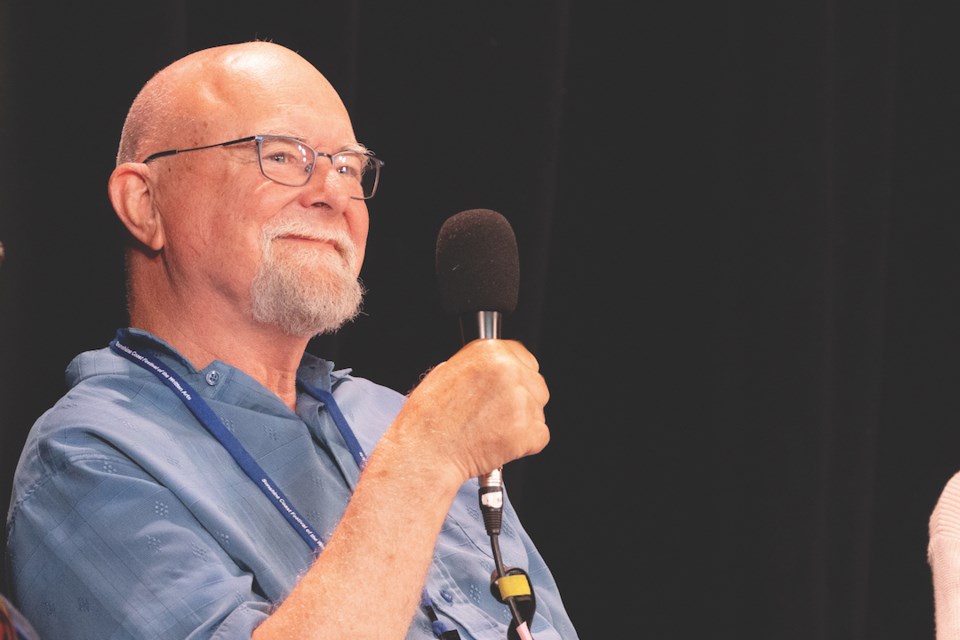The Canadian publishing success story set in Madeira Park had its fullest telling yet at the Clifford Smith Memorial Lecture last week.
Howard White, who founded Harbour Publishing in 1974 with his wife Mary — and bought the longstanding Douglas & McIntyre imprint a decade ago — delivered the annual lecture to a near-capacity audience at the Raven’s Cry Theatre in Sechelt on Nov. 2.
White’s appearance follows a dozen other luminaries, including former BC Lieutenant Governor Stephen Point and onetime attorney general Wally Oppal, previously featured in the lecture series sponsored by the Sunshine Coast ElderCollege and named for former School District 46 superintendent Clifford Smith. Smith died in 2006.
“[Smith] was a passionate advocate of lifelong learning and was a former chair of Elder College’s original board,” explained ElderCollege board member Ann Hopkins.
White reflected on his personal connection with the lecture’s namesake: “Back in the good old days when Clifford was running the school district here and I was running the Coast News in Gibsons, we had a few set-tos,” he recalled.
This year marks the 50th anniversary of Harbour Publishing. White’s lecture (“1000 Books in 50 Years”) comes on the heels of earlier celebrations, including at the Sunshine Coast Festival of the Written Arts in August and a music-and-storytelling revue by CBC broadcaster Grant Lawrence in October. An event in May at SFU Harbour Centre honoured White alongside longtime MacLeod’s Books owner Don Stewart.
“It’s very easy for the focus on Howie’s and Mary’s impressive publishing achievements to obscure his many writing achievements,” said poet and novelist Andreas Schroeder. “But it’s his enormously amusing, insightful and often hilariously smart-ass personal reminiscences that are truly at the core of his outstanding reputation — because his stories aren’t mostly inventions; they’re largely lived experiences.”
White described his early childhood in a logging camp on Nelson Island, before his father (later the author of two books published by White’s firm) moved the family to Pender Harbour.
“My dad was tickled when I started getting paid for writing in the local paper,” he recalled, “but he still couldn’t accept the idea of spending good daytime hours scribbling when there was wood to be chopped. It took me a long time to believe sitting with a pen in my hand was just as legitimate a way to spend working hours as driving the garbage squish at the Pender landfill.” White continued his part-time labours at the landfill until the mid-1980s. “I think a lot of people around Pender Harbour still feel that was the last time I had an honest job,” he opined.
Howard and Mary White established the serial publication Raincoast Chronicles to document West Coast characters and their hardscrabble industries. Three thousand copies printed of its first issue sold out rapidly, as did its four sequels. “Around this time, we realized what we had here was not really a typical magazine,” he said. “Nobody was throwing their old copies away — they were collecting them.”
As its scope of operations widened, Harbour specialized in uncovering and promoting uncommon talent. Anne Cameron’s Earth Witch was a book of erotic lesbian poetry that sold a record-breaking 10,000 copies. (“I read the manuscript and learned a lot,” admitted White.) Hubert Evans published his first novel (O Time in Your Flight!) at age 87. Bus Griffiths, an unschooled logger, wrote the story of his life in comic book form. (“It’s now considered Canada’s first graphic novel,” White observed.)
As the national publishing industry became concentrated in Ontario and an influx of online retailers displaced B.C. books from sellers’ shelves, Harbour adhered to advocacy for regionally rooted works.
“At this year’s B.C. book awards, we were the only B.C. publishers to win against the big multinationals,” White noted. “And we won in four categories. Our office on Rondeview Road is running out of wall space to hang the provincial and national and international awards. Our books keep winning.”
White lamented the disproportionate value of tax credits allocated to the book publishing industry (in B.C., the sum is only $3 million annually while the film industry receives $900 million in credits). “Since the 1980s, book publishing has long been treated as the poor sister among Canada’s cultural industries and those chickens are now coming home to roost in a very alarming way,” he said.
The firm’s anniversary precipitated accolades from around the world. “We’ll send out books into the world like messages in bottles,” concluded White, “but we seldom get to hear where they end up or what effect they have. It’s been very gratifying to receive appreciation and good wishes that have come our way. It makes me feel like whatever the next chapter brings, we’ve spent the past 50 years fighting a good fight.”



